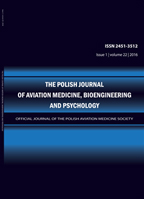2017, Volume 23, Issue 1
ANALYSIS OF THE SPEED OF RESPONSE TO ACOUSTIC STIMULI IN ISCHEMIC HYPOXIA AND ORTHOSTATIC STRESS-INDUCED CONDITIONS AT THE ORTHO-LBNP TRAINING SYSTEM
Paulina BARAN1, Mariusz KREJ1, Łukasz DZIUDA1
-------------------------------------------------------------------------------------------------
1Department of Flight Simulator Innovations, Military Institute of Aviation Medicine
Autor korenspondencyjny: Paulina BARAN; Department of Flight Simulator Innovations, Military Institute of Aviation Medicine; email: pbaran@wiml.waw.pl
Full text
Streszczenie
Introduction: Lower body negative pressure (LBNP) is a method used to induce physiological stress in the human body, especially in the cardiovascular system. In response to physical stressors, including pressure reduction in the lower half of the body, the human cognitive function deteriorates. The speed of response to stimuli is one of the indicators of the speed of hidden cognitive processes involved in the performance of a specific task. The aim of the presented tests at the ORTHO-LBNP system was to assess the time of reaction to sound stimuli due to pressure changes and verticalization.
Methods: The research was carried out on a group of 17 cadets of the Polish Air Force Academy in Dęblin, aged 23-29. During the experiment, single sound signals were presented to the tested subjects at intervals of about 20 seconds, to which they were supposed to react as soon as possible through pushing a button. Average response times to stimuli in individual phases of the study and in the phase without experimental impact were calculated.
Results: Single-factor analysis of variance with repeated measurement did not reveal statistically significant differences between mean measurements of response times in the four test phases (P > 0.05). The response rate, which is an indicator of the cognitive efficiency of the cadets, remained at a comparable level throughout the study and was independent of pressure and orthostatic stimuli.
Discussion and Conclusion: The duration of ORTHO-LBNP exposure was not long enough or the stimuli generated during the experiment were not strong enough to obtain differences in the speed of response of the tested subjects to sound stimuli. However, due to the influence of reduced pressure on human cognitive efficiency documented in the literature, it is justified to continue the studies using the ORTHO-LBNP system.
Słowa kluczowe
LBNP, hypoxia, orthostatic stress, reaction time, training, pilots
